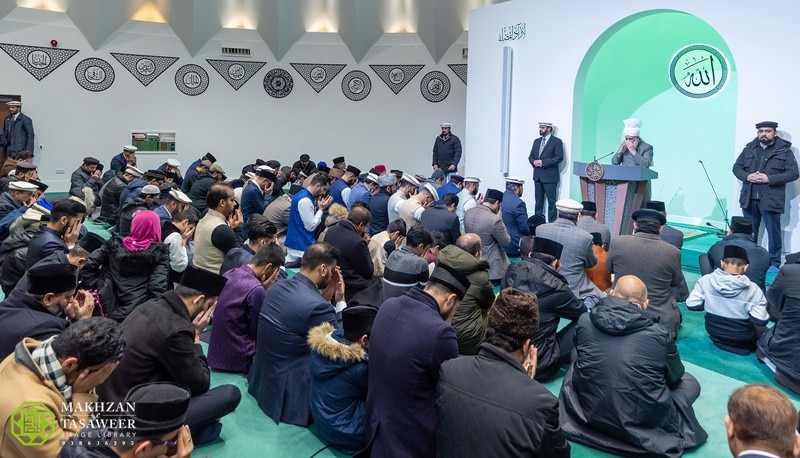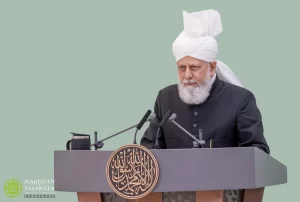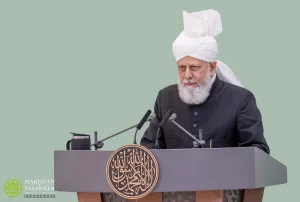On certain occasions, while announcing a Nikah [Islamic marriage announcement], the Fifth Caliph and Worldwide Head of the Ahmadiyya Muslim Community, His Holiness, Hazrat Mirza Masroor Ahmad (aba) imparts invaluable words of advice. These should be heeded not only by the new couples but by all who wish to establish true peace and success, in their relationships and homes.
The Review of Religions is pleased to present the English translations of the guidance imparted by His Holiness (aba) on such occasions of Nikah. We have included only those parts of the Nikah sermons in which His Holiness (aba) has imparted advice, and left out specific details such as names and dowry.

Members join His Holiness (aba) in silent prayers after a Nikah (photo taken pre-pandemic)
On 23 April 2012, His Holiness, Hazrat Mirza Masroor Ahmad (aba) announced four Nikah ceremonies in Fazl Mosque, London. After reciting Tashahhud, Ta‘awwuz and the Qur’anic verses of Nikah, Hazrat Mirza Masroor Ahmad (aba) stated:
‘In matters of Nikah and marriage, it should always be remembered that newly formed relationships cannot progress until and unless the two parties express their feelings of mutual trust. For this reason, both the boy and girl should always confide in one another in every matter, and following their marriage, the relationship between husband and wife should be the most reliable and trustworthy. If this is kept in view, it would prevent marriages from becoming rifted; marriages would not break. These distressing circumstances are becoming prevalent in the Jama’at as well; marriages take place and become rifted due to petty matters, which results in separation. One should be mindful of the fact that patience is required and mutual trust must be established. If patience is developed, then the minor misunderstandings that one faces would vanish on their own and a sense of trust would be established.
Thus, always remember that we are Ahmadis and our position is unique amongst others. Here in the UK, it is often stated that 50% of marriages end in divorce. However, according to the various sources, I have gathered information from, it is regretful that approximately 20% of marriages in the Jama’at are now ending in divorce. This is a gravely dangerous matter. May God Almighty endow these new marriages, future marriages, and old marriages with a lasting sense of mutual trust. May they all be heedful of their futures instead of concentrating on worldly matters. With these brief remarks, I will now announce the Nikah ceremonies.’
Original Urdu published in Al-Fazl International Edition: 28 February 2014 p. 10
Article Source Link




